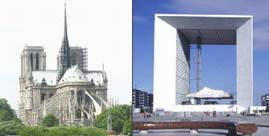
I do not know how many of you read David Warren Online. Consider this a signpost. Go and read A Truth Exposed. Some excerpts:
A film with no script, no dialogue, and a soundtrack entirely in Gregorian chant, has been playing to packed houses in Germany, and now across Europe. A feature-length documentary, it has no interviews, no narrator, no background material. Entitled Die Grosse Stille -- Into Great Silence -- it is about the life of the monks in Grande Chartreuse, the mother house of the Carthusian monastic order.
It was made by Philip Groening, who won the trust of the order’s General Prior. The filmmaker was working from a treatment first projected 22 years ago, which was never revised. With no team, he lived in a cell, assuming the life of a monk himself, participating in all unskilled work, and himself observing the silences to the point where he found the rubbing of fabric in his jacket unbearably loud.
(snip)
What most interested me, and the person who brought the film to my attention, was a single remark of the filmmaker, about what he had learned from making his documentary. He told the BBC, “When I left the monastery, I was thinking about what exactly had I lived through and it was realizing that I had had the privilege of living with a community of people who live practically without any fears.”
Smoothing Plane again. The contemporary composer Arvo Part, after the banning of his composition Credo in Estonia in 1968, began a years long silence from composing:
Pärt turned again to self-imposed silence, during which time he delved back through the medievalism of his 3rd Symphony and through plainchant to the very dawn of musical invention. He re-emerged in 1976 after a transformation so radical as to make his previous music almost unrecognisable as that of same composer. The technique he invented, or discovered, and to which he has remained loyal, practically without exception, he calls tintinnabuli (from the Latin, little bells), which he describes thus: "I have discovered that it is enough when a single note is beautifully played. This one note, or a silent beat, or a moment of silence, comforts me. (emphasis mine)
In George Weigel's book, The Cathedral and the Cube, the first chapter or two discuss the omission of any mention of the contributions of Christianity in the preamble to the 70,000 word EU consitution. As if, he says, nothing of significance occured from the fall of Rome until the Enlightenment. He asks, who better able to defend, as we see now only too clearly, the values espoused in that preamble, but the source of which was ignored in the documents, and is ignored in practice in Europe today. Will it be the builders of Notre Dame, or the Cube, the 40 story Great Arch of la Defense? As Weigel says: "what culture is better able to provide the foundations for the human rights that this monument celebrates: the culture of the cube, rationalist, sceptical, relativist, secular, or the culture that produced the “holy unsaneness” of Notre Dame?
Without a Great Silence beneath us, among us, within us, there is nothing. A great and terrible nothingness is advancing upon us. One of those nothingnesses, masquerading as the Religion of Islam, threatens to devour all Europe. Another, though less overt, slaughtering only the undifferentiated tissue mass which magically becomes a human being, is equally pernicious. If we do not come to our knees on our own, and reconnnect our small selves with God, the conflagrations coming which will force us there, may be unendurable.
Coda: I recommend St. Paul's "Pray without ceasing." Yes, the first thing to get past are feelings of foolishness, the intense need of us narcissistic me-firsters to be cool, detached, non-committal. There is no sideline.

No comments:
Post a Comment